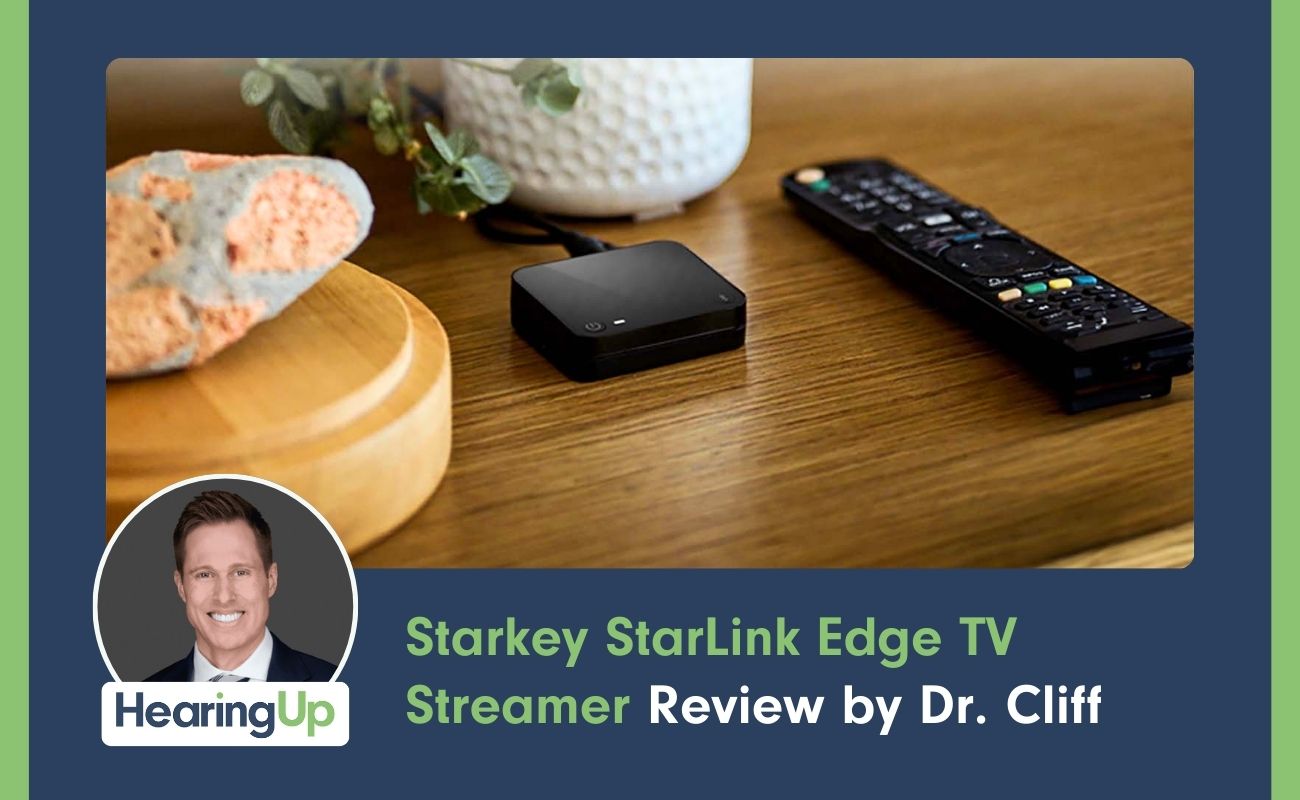Hi guys. Rachael Cook, Doctor of audiology at Applied Hearing Solutions in Phoenix, Arizona, and in today's video, I'm going to be showing you the best way to hear your TV using Roku. Coming up.
Dialogue on TV is notoriously difficult to follow, which can be pretty annoying when you're trying to watch your favorite TV shows and movies. For example, reality TV shows like Big Brother and Survivor have their fair share of jaw dropping secrets, but these are often exchanged in whispers so that other contestants can't hear them. Whispers can be hard to hear on their own, but the distance between yourself and the TV can decrease overall volume, making them even harder to hear. Not only that, but the sound quality can be negatively impacted by reverberation that occurs as the sound bounces off of hard surfaces or floors and high ceilings. In addition, partial blame can also be placed on poor audio mixing where the background sounds and music are blended too closely with the dialogue, making speech even harder to hear. Difficulty understanding dialogue on the TV is also a characteristic trait of high frequency hearing loss, the kind that is common with aging and repeated loud noise exposure.
In many instances, just properly programmed hearing aids can greatly improve your TV watching experience. However, direct audio input can dramatically improve both sound quality and sound clarity. Even further direct audio input is the wireless transmission of audio from your TV or cell phone to headphones or hearing aids. Because the audio quality is not degraded by things like distance, reverberation or other background sounds, the sound quality is excellent, and if you have a Roku and a pair of headphones or Bluetooth hearing aids, you can experience direct audio input from your TV today. But before I tell you just how it's done, please give this video a thumbs up to bring videos like these to a wider audience. And while you're at it, be sure to hit that subscribe button with notification bell so that you never missed anyone of our newly released videos. I really appreciate it.
Now let's jump in into how you can stream your favorite TV shows or movies directly into your headphones or hearing aids. To begin, Roku is a streaming media player that has been around since 2002. Roku allows you to access all of your favorite streaming services, such as Netflix, Hulu, or Amazon Prime TV from one home screen, but it also has a pretty neat audio streaming feature that most people are unaware of. Roku is available two ways: as a TV accessory box that can be added to any television or as an integrated feature of TCL Roku TVs. You can try this feature out for yourself so long as you have a Roku, Bluetooth enabled headphones or hearing aids, and a smartphone with the Roku app. To begin, you'll need to download the Roku app. Once downloaded, you will be prompted through the setup to connect your smartphone to your TV.
Once your TV is paired up with your smartphone, you will then need to plug in or pair your headphones to your smartphone as well. Once you get into the Roku app, you will see a remote control button on the bottom right hand side. Once you are in the remote control screen, you will then see a small headphone icon on the bottom right. Once selected, the sound from the TV will be streamed straight from the device into both headphones. In addition to excellent sound quality and volume, this is also great for watching TV at night without waking up any of your family members, during the day without waking up napping children, and without disturbing any work from home family members. And if you have a hearing loss that is treated with Bluetooth-enabled hearing aids, you can also take advantage of this amazing feature. With hearing aids, you will not only get the benefit of direct audio input, but this audio will also be adjusted for your specific hearing loss.
This can be an incredible feature for hard of hearing individuals, but unfortunately, you cannot stream the audio to hearing aids and play sound through the TV speakers at the same time. So this is not a great feature if you're trying to watch the television with multiple people. However, if you want the benefits of direct audio input and want other people in the home to be able to hear the television at the same time, this can be achieved through the use of a proprietary TV streamer. Compatible TV streamers allow you to stream audio from the TV to your devices while also playing through the TV speakers at the same time. Direct streaming of audio from the television will completely change how well you hear the dialogue of your favorite shows and movies. And now you know how to do it using a Roku streamer or Roku TV. However, you will need to be careful because once you start streaming TV directly into your ears, it's hard to go back. That's it for this video. If you liked it, go ahead and give it a thumbs up and share it with someone that you feel could use it. And if you haven't already, go ahead and hit that subscribe button with notification bell so that you never miss anyone of our newly released videos.
Hi guys. Rachael Cook, Doctor of audiology at Applied Hearing Solutions in Phoenix, Arizona, and in today's video, I'm going to be showing you the best way to hear your TV using Roku. Coming up.
Dialogue on TV is notoriously difficult to follow, which can be pretty annoying when you're trying to watch your favorite TV shows and movies. For example, reality TV shows like Big Brother and Survivor have their fair share of jaw dropping secrets, but these are often exchanged in whispers so that other contestants can't hear them. Whispers can be hard to hear on their own, but the distance between yourself and the TV can decrease overall volume, making them even harder to hear. Not only that, but the sound quality can be negatively impacted by reverberation that occurs as the sound bounces off of hard surfaces or floors and high ceilings. In addition, partial blame can also be placed on poor audio mixing where the background sounds and music are blended too closely with the dialogue, making speech even harder to hear. Difficulty understanding dialogue on the TV is also a characteristic trait of high frequency hearing loss, the kind that is common with aging and repeated loud noise exposure.
In many instances, just properly programmed hearing aids can greatly improve your TV watching experience. However, direct audio input can dramatically improve both sound quality and sound clarity. Even further direct audio input is the wireless transmission of audio from your TV or cell phone to headphones or hearing aids. Because the audio quality is not degraded by things like distance, reverberation or other background sounds, the sound quality is excellent, and if you have a Roku and a pair of headphones or Bluetooth hearing aids, you can experience direct audio input from your TV today. But before I tell you just how it's done, please give this video a thumbs up to bring videos like these to a wider audience. And while you're at it, be sure to hit that subscribe button with notification bell so that you never missed anyone of our newly released videos. I really appreciate it.
Now let's jump in into how you can stream your favorite TV shows or movies directly into your headphones or hearing aids. To begin, Roku is a streaming media player that has been around since 2002. Roku allows you to access all of your favorite streaming services, such as Netflix, Hulu, or Amazon Prime TV from one home screen, but it also has a pretty neat audio streaming feature that most people are unaware of. Roku is available two ways: as a TV accessory box that can be added to any television or as an integrated feature of TCL Roku TVs. You can try this feature out for yourself so long as you have a Roku, Bluetooth enabled headphones or hearing aids, and a smartphone with the Roku app. To begin, you'll need to download the Roku app. Once downloaded, you will be prompted through the setup to connect your smartphone to your TV.
Once your TV is paired up with your smartphone, you will then need to plug in or pair your headphones to your smartphone as well. Once you get into the Roku app, you will see a remote control button on the bottom right hand side. Once you are in the remote control screen, you will then see a small headphone icon on the bottom right. Once selected, the sound from the TV will be streamed straight from the device into both headphones. In addition to excellent sound quality and volume, this is also great for watching TV at night without waking up any of your family members, during the day without waking up napping children, and without disturbing any work from home family members. And if you have a hearing loss that is treated with Bluetooth-enabled hearing aids, you can also take advantage of this amazing feature. With hearing aids, you will not only get the benefit of direct audio input, but this audio will also be adjusted for your specific hearing loss.
This can be an incredible feature for hard of hearing individuals, but unfortunately, you cannot stream the audio to hearing aids and play sound through the TV speakers at the same time. So this is not a great feature if you're trying to watch the television with multiple people. However, if you want the benefits of direct audio input and want other people in the home to be able to hear the television at the same time, this can be achieved through the use of a proprietary TV streamer. Compatible TV streamers allow you to stream audio from the TV to your devices while also playing through the TV speakers at the same time. Direct streaming of audio from the television will completely change how well you hear the dialogue of your favorite shows and movies. And now you know how to do it using a Roku streamer or Roku TV. However, you will need to be careful because once you start streaming TV directly into your ears, it's hard to go back. That's it for this video. If you liked it, go ahead and give it a thumbs up and share it with someone that you feel could use it. And if you haven't already, go ahead and hit that subscribe button with notification bell so that you never miss anyone of our newly released videos.

HRV objectively measures stress affecting tinnitus by tracking autonomic balance, enabling data-driven treatment adjustments via Modern Tinnitus Basecamp.
Read More
AirPods Pro 3 with iOS 18.1+ offer clinical-grade hearing aid features for mild-moderate loss, including built-in testing, custom amplification, and audiogram uploads.
Read More
Starkey StarLink Edge uses Auracast to stream TV audio to any compatible device, offering the smallest size and longest range of manufacturer TV streamers.
Read More
Three methods confirm hearing aid performance: test box for specs, Real Ear Measurement for accuracy, and outcome assessments for effectiveness.
Read More.jpg)
Daily shower water flushing helps prevent earwax buildup more effectively and affordably than products, though impacted wax needs professional removal.
Read More
LACE AI Pro uses AI to deliver personalized auditory training, boosting brain processing skills beyond what hearing aids alone can provide.
Read More